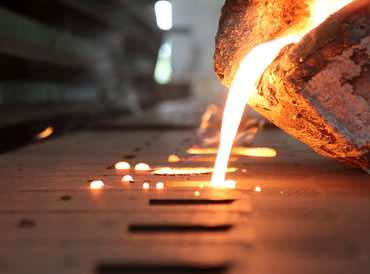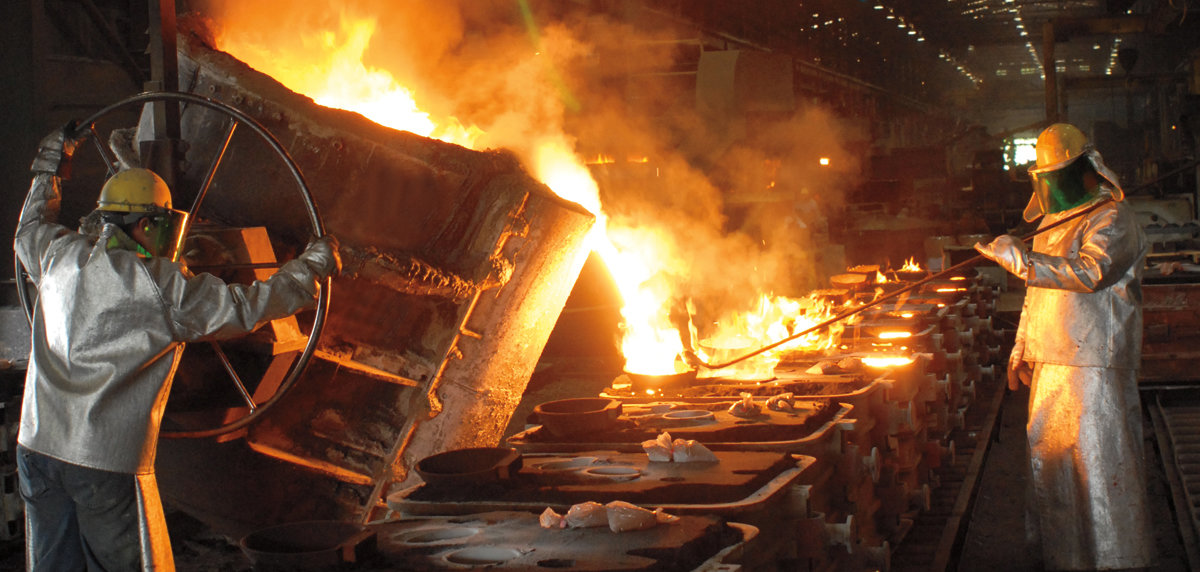The Complete Beginner’s Guide to Understanding a Metal Foundry
A Comprehensive Guide to Metal Casting: Benefits and Providers Provided by Foundries
Metal casting is a vital process in different industries, using various advantages with the solutions of factories. These facilities change molten metal right into accurate and durable elements, satisfying particular customer demands. By utilizing sophisticated technologies, shops ensure top quality and effectiveness in manufacturing. Nevertheless, the intricacies of metal casting and the diverse techniques included raise important questions regarding its role in contemporary manufacturing. What developments lie ahead in this essential area?
Understanding the Metal Casting Process
The metal casting procedure is a basic method made use of in producing to develop intricate forms and components. This method includes pouring molten metal into a mold developed to develop the wanted item. The process begins with pattern development, which acts as a theme for the mold and mildew. Metal Casting. Different materials, such as sand, metal, or ceramic, are used for mold-making, relying on the details needs of the casting
When the mold is prepared, liquified metal is put right into it and allowed to strengthen and cool. After solidification, the mold is removed, disclosing the actors part. Numerous strategies, including sand casting, investment casting, and pass away casting, are utilized, each suited to different applications and products. Quality control steps, such as evaluations and screening, are important to guarantee the end product meets requirements. Overall, the metal casting process plays a vital role in generating parts for markets varying from automotive to aerospace.
Secret Conveniences of Metal Casting
Metal casting provides substantial advantages that make it a favored manufacturing technique in various markets. Its layout versatility and accuracy enable for intricate forms, while cost-effective automation enhances performance. Additionally, the versatility and toughness of materials utilized in casting add to the resilience of the final items.
Design Adaptability and Accuracy
Releasing exceptional design adaptability and precision, metal casting enables designers and engineers to produce detailed shapes and features that would certainly be difficult or difficult to accomplish with various other manufacturing techniques. This capacity makes it possible for the manufacturing of complex geometries, inner structures, and fine information that boost item functionality and appearances. Furthermore, numerous casting strategies, such as sand casting, investment casting, and die casting, supply further choices for modification, suiting varied material buildings and project demands. The adaptability of mold and mildews allows adjustments during the design phase, simplifying the shift from concept to last product. Inevitably, metal casting sticks out for its ability to deliver high-precision elements, making it an indispensable procedure in sectors varying from auto to aerospace and past.
Cost-Effective Automation
Economical mass production stands as one of the primary advantages of metal casting, enabling producers to create large amounts of elements at a lower expense each. This performance occurs from the capability to produce elaborate molds that can be reused numerous times, substantially reducing setup and operational prices. In addition, metal casting procedures, such as sand casting and pass away casting, enable high throughput, making it practical to fulfill the needs of large manufacturing runs. The lowered product waste and power consumption even more boost price financial savings, making metal casting an eye-catching alternative for sectors requiring mass elements. Generally, the economical nature of metal casting placements it as a recommended technique for manufacturers going for economic efficiency in their manufacturing processes.
Material Flexibility and Strength
Among the standout features of metal casting is its impressive product convenience, which permits using a wide variety of alloys and metals. This adaptability allows manufacturers to choose materials that finest match their particular applications, from aluminum and bronze to iron and steel. Each metal supplies distinct buildings, including differing degrees of strength, deterioration resistance, and thermal conductivity. Metal casting can create elements that meet strict efficiency needs across varied sectors, such as automobile, aerospace, and building. Additionally, the stamina of cast steels can be boosted via different treatment processes, guaranteeing toughness and long life. Aluminum Casting. On the whole, the mix of product adaptability and inherent stamina makes metal casting a favored option for generating high-quality components
Types of Metal Casting Methods
Metal casting incorporates a variety of strategies that deal with various production needs and product residential or commercial properties. Common techniques include sand casting, which utilizes a sand mold for intricate forms, and financial investment casting, understood for its precision and surface area finish. Die casting is another strategy that employs high-pressure shot of molten metal into molds, suitable for automation of little components.
Covering molding offers a faster alternative, utilizing a resin-coated sand to develop thin-walled molds, while shed foam casting permits for detailed designs without the need for a core.
In addition, continual casting is made use of for producing long areas of metal, such as bars or sheets, by solidifying molten metal in a continuous procedure. Each strategy is and offers unique advantages picked based upon aspects like the needed information, manufacturing quantity, and product type, making sure superior outcomes in metal construction throughout different industries.
The Role of Foundries in Metal Casting
Factories play a critical role in the metal casting process, acting as the centers where molten metal is changed right into completed products. These specialized facilities are furnished with the required tools and innovations to manage various metals, ensuring top notch end results. Foundries are accountable for numerous essential features, including melting the metal, pouring it into mold and mildews, and permitting it to solidify.
In addition, they preserve stringent security and ecological criteria to safeguard employees and decrease environmental effect. Competent specialists and designers collaborate to optimize casting procedures, enhancing performance and decreasing waste. Foundries also take part in top quality control measures, making sure that the last items meet particular resistances and specs. This quality control is vital for markets that rely upon specific components, such as vehicle and aerospace. Therefore, shops add significantly to the general production landscape, making it possible for technology and growth across various industries.
Custom-made Metal Casting Providers
Personalized metal casting services provide tailored style remedies that fulfill certain client demands. These services also supply product choice knowledge, ensuring the best metal is selected for the desired application. Such flexibility and knowledge enhance the overall top quality and efficiency of the final product.

Tailored Layout Solutions
Tailored style solutions in metal casting supply manufacturers with the versatility to develop components that fulfill specific performance and visual requirements. Factories supply customized read more solutions that permit clients to specify measurements, shapes, and surface coatings to attain desired results. This modification process commonly includes collaboration between designers and designers, ensuring that the end products straighten with functional needs and market criteria. Advanced technologies, such as computer-aided style (CAD) and simulation software, allow specific modeling and testing of parts before manufacturing, decreasing mistakes and boosting effectiveness. By leveraging tailored design solutions, businesses can maximize capability while lowering waste and prices, ultimately leading to an extra affordable side in the marketplace. This flexibility is essential for industries requiring special applications and specs.
Material Option Know-how
When choosing materials for metal casting, experience plays a crucial function in guaranteeing that the appropriate option straightens with both performance needs and cost-effectiveness. Factories use competent professionals that understand the residential or commercial properties of various metals and alloys, permitting them to recommend suitable materials for certain applications. Factors such as toughness, corrosion resistance, and thermal conductivity are very carefully considered to fulfill the client's requirements. In addition, market trends and improvements in product science notify these decisions, enabling foundries to remain competitive. By leveraging their proficiency, foundries can help clients in guiding through facility material choices, eventually leading to boosted product quality and lowered production prices. This customized understanding is important for achieving effective outcomes in personalized metal casting services.
Top Quality Control in Metal Casting
Quality control in metal casting is essential to assure that the end products fulfill the needed specifications and performance criteria. Factories utilize a selection of approaches and methods to ensure the best quality of actors components. This process starts with rigorous material assessments, validating that raw materials conform with sector standards. Throughout the casting process, real-time tracking and screening are performed to assess parameters such as temperature level, mold and mildew integrity, and dimensional accuracy.

Applications of Metal Castings Across Industries
Metal spreadings play an essential function in different industries, functioning as the foundation for plenty of applications. In the auto industry, cast elements such as engine blocks and transmission real estates are needed for vehicle efficiency and integrity. The aerospace market depends on precision spreadings for crucial elements that guarantee security and performance in flight. Furthermore, the construction market makes use of metal castings for fixtures, installations, and architectural elements, improving the durability of buildings and facilities.
Furthermore, the energy market take advantage of castings utilized in generator blades and various other equipment vital for power generation - Aluminum Foundry. The clinical area additionally utilizes metal castings in tools and tools, showing the versatility of this manufacturing process. In general, metal spreadings are indispensable to the functionality and advancement of varied fields, showcasing their importance in modern innovation and infrastructure development
Regularly Asked Inquiries
What Products Are Commonly Used in Metal Casting?
Common materials used in metal casting include aluminum, iron, bronze, brass, and steel. Each product uses one-of-a-kind residential properties appropriate for numerous applications, enabling producers to pick the very best option based on strength, weight, and rust resistance.
How Long Does the Metal Casting Refine Generally Take?
The metal casting procedure typically takes a number of hours to a couple of days, depending on elements such as the intricacy of the layout, sort of metal utilized, and the specific casting technique used by the shop.
What Is the Ecological Impact of Metal Casting?
The environmental effect of metal casting consists of power consumption, emissions, and waste generation. Factories commonly implement steps to minimize these results, such as recycling materials and utilizing cleaner innovations to lower their ecological footprint.
Can Metal Casting Be Provided For Small-Scale Projects?
Metal casting can without a doubt be executed for small tasks. Various foundries satisfy such needs, offering personalized options that fit restricted production runs while preserving high quality and precision in the end products.
What Are the Precaution in Metal Casting Foundries?
In metal casting foundries, precaution consist of personal protective devices, correct ventilation, training on tools usage, emergency procedures, normal maintenance checks, and adherence to industry security criteria to minimize dangers connected with molten metal and unsafe materials.
In addition, metal casting processes, such as sand casting and die casting, enable for high throughput, making it possible to satisfy the needs of large-scale production runs. One of the standout characteristics of metal casting is its impressive material flexibility, which permits for the usage of a broad variety of alloys and steels. Furthermore, constant casting is made use of for producing long sections of metal, such as bars or sheets, by solidifying molten metal in a continuous process. Factories play an essential function in the metal casting process, serving as the facilities where molten metal is transformed into completed products. Common materials utilized in metal casting include aluminum, iron, bronze, brass, and steel.